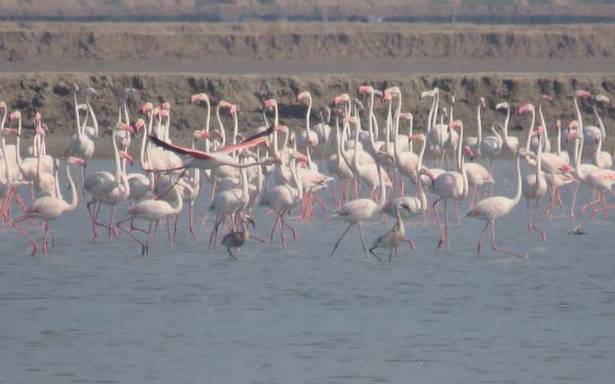About 40,000 greater flamingos spotted during the census in coastal wetlands
Counting of around a million birds of about 80 species in the first-ever synchronised bird census in Tamil Nadu, has revealed that the State’s coastal wetlands support global populations of migratory birds.
The Tamil Nadu Forest Department joined hands with the Bombay Natural History Society (BNHS), in collaboration with Wildlife Institute of India (WII) and Salim Ali Centre for Ornithology and Natural History (SACON). About 45 civil society groups and non-governmental organisations, and about 10 colleges and universities participated in the two-day exercise.
The census was conducted in thirteen coastal districts, including Chennai and Kanniyakumari, with pre-training, orientation and trial runs.
Large congregations of the greater flamingos, counting up to approximately 40,000, were also recorded. The greater flamingos were found in large numbers in major areas like Point Calimere (20000), Valinokkam (10000), Dhanushkodi (2000), Thoothukudi (2000), Kanniyakumari (600) among other minor sites, said Shekhar Kumar Niraj, PCCF and Chief Wildlife Warden, TN.
Interestingly the world’s longest non-stop flying wader, bar-tailed godwit and ruddy turnstone, and the highest flying bird, bar-headed geese, were also recorded in large numbers.
In a major highlighter, the Arctic breeding waders and little stints, constituted the major population, followed by curlew sandpipers, another major find. Several hundred grey-headed lapwing were seen in Pallikaranai and Kaliveli.
Major congregations of waders such as marsh sandpipers, lesser sand plover, redshanks, ruffs, great knots, spotted redshanks, and a number of uncommon species like the Eurasian curlew, whimbrel, ruddy turnstone, were spotted at Point Calimere, Pichavaram, Adyar creek, Kaliveli Lake, Thoothukudi, and Ramanathpuram.
Major congregations of ducks included Northern pintails, Northern shovellers, Eurasian wigeon, and gargeney. They were sighted at Point Calimere, Kanniyakumari, Muthupet, Adyar creek, Pulicat lagoon, Kaliveli Perumpakkam and Elcot areas.
Large populations of terns such as caspian, whiskered, greater crested tern and lesser crested terns were sighted at Point Calimere, Rameswaram, Pulicat and Kanniyakumari coastal areas. Major population of gulls were also registered at Point Calimere, Rameswaram, and Pulicat.
The results of counting in the census during January 28 and 29, and during the pre-census surveys from January 9 to 19, suggest that Tamil Nadu’s coastal wetlands support global populations of migratory birds and therefore are extremely important for conservation measures and monitoring, Mr. Niraj said.
Major habitats included mud flats, marsh lands, salt pans, creeks, estuaries and lagoons. The coast of Tamil Nadu and Puducherry is about 1,076 km long and constitutes 15% of India’s coastline. Sandy beaches and dunes, mangrove forests, mudflats, salt marshes, backwaters, and creeks are the natural ecosystems and artificial ecosystems include saltpans and aquaculture ponds.
The duration of stay of migratory birds depends on the water conditions of the marshes and swamps, which is influenced by the rainfall pattern. The flourishing rain in 2020 and 2021 have nourished the ecosystem, allowing the successful migration of shorebirds to their nesting sites and their abundant population here, during their subsequent current non-breeding season, he said.
Source: Read Full Article

